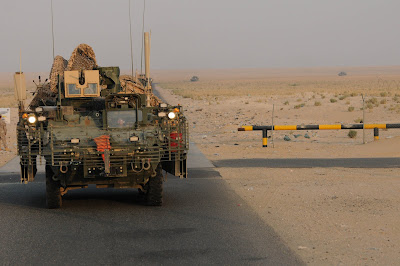
As the 4th Stryker Brigade Combat Team of the U.S. Army's 2nd Infantry Division rolls out of Iraq, representing the withdrawal of the final combat unit from the country ahead of the self-imposed politically-driven deadline of August 31, it might be useful to think about our future troop presence in Iraq and the Persian Gulf region. According to an agreement with the Iraqi government negotiated by the Bush Administration, all American troops will be out of Iraq by the end of 2011.
Is that really in the national interests of the United States? Is that a smart foreign policy move? After removing Saddam Husayn and installing an elective government in Iraq costing us the lives of over 4,000 of our troops (and thousands more wounded), should we really just pack up and go home?
I think we would be wise to reconsider that December 31, 2011 date. First, we should have never agreed to a specific withdrawal date - that merely tells your adversaries how long they must hold out and how strong - or not - your political will is. All withdrawal dates should be situation dependent - we should have been clear (isn't that one of President Obama's favorite concepts) that American troops will depart only when American goals have been met.
Let's assume for argument's sake by December 2011 that the situation in Iraq will have improved to the point that the remaining 50,000 troops in country for the "advise and assist" mission are no longer required. Just because the Iraqi military and security forces might attain self sufficiency should not dictate that no American troops remain in Iraq. Our national interests in the region do not end with Iraqi forces completely taking over their own missions. The United States will still need a strong presence in the region. One only need to look to the east for maybe the primary reason - the ascension of Iran as regional power. If the Iranians are not convinced through sanctions and diplomatic pressure to halt their efforts to develop a nuclear weapon, and neither the United States nor Israel use military force to stop it, we will be faced with a nuclear-armed Iran sitting astride one of the world's most strategic waterways.
The United States will still need a strong presence in the region. One only need to look to the east for maybe the primary reason - the ascension of Iran as regional power. If the Iranians are not convinced through sanctions and diplomatic pressure to halt their efforts to develop a nuclear weapon, and neither the United States nor Israel use military force to stop it, we will be faced with a nuclear-armed Iran sitting astride one of the world's most strategic waterways.
Iran is cited by the U.S. intelligence community as the world's foremost state sponsor of terrorism. Acquisition of a nuclear weapons capability is not going to lessen that support, in fact, it may embolden the regime in Tehran to escalate its activities. We already see an Iranian hand in Lebanon, the Gaza Strip, Iraq, Afghanistan - they have also been in Chechnya and Bosnia in the past. Where will they start trouble next? Saudi Arabia? Bahrain? The UAE?
About one-quarter of the world's oil flows from the Persian Gulf through the Straits of Hormuz and into the Gulf of Oman and Arabian Sea every day. As long as the United States and the rest of the industrialized world relies on oil to fuel their economies, not to mention the increasing appetite for oil in China and India, the Persian Gulf will continue to be of strategic importance to the United States. It is vital that we have influence in this area. Influence includes the ability to project power to protect our interests, and in this part of the world, that means a robust American military presence. While warships and aircraft are strong symbols of American power, there is nothing like the presence of American soldiers - or as some say, "boots on the ground."
What better place than Iraq for a robust American military presence? There is plenty of room for prepositioned military equipment, training areas, and airspace, and it is centrally located if military forces are required anywhere in the region. As long as Iran remains a concern, there is nothing like an American presence on their western border in Iraq and on the eastern border in Afghanistan.
We have invested a lot of blood and treasure to set Iraq up as a democracy (of sorts). We still have vital interests in the region. Why leave?
August 18, 2010
U.S. combat troops leave Iraq - politics or reason?
Labels:
Iraq

.jpg)
